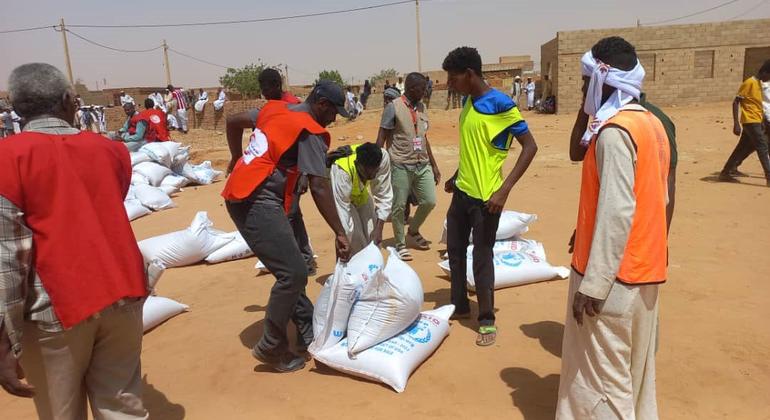UN humanitarian ended the first food distribution in Khartoum as hunger, threat to children, etc

The WFP’s Country Director in Sudan, Eddie Rowe, told reporters in Geneva that there is a significant progress, the agency. distributed food aid to 15,000 people in both the Sudanese military (SAF) and the Rapid Support Forces (RSF) lead the Omdurman region, part of the Khartoum metropolitan region, starting on Saturday.
Speaking from Port Sudan, Mr Rowe highlighted recent food distributions, in Wadi Halfa in the Northern Territory reach 8,000 people who fled Khartoum and are on their way to Egypt, and 4,000 internally displaced people in Port Sudan.
Quickly escalate support
Overall, WFP has been able to reach 725,000 people across 13 states in the country since resuming its operations on May 3, following a pause caused by the killing of three aid workers at the beginning of the conflict.
Mr. Rowe said that the WFP is urgently increasing its support, which they hope to expand based on progress in negotiations for humanitarian access for all regions, including Darfurs and Kordofans, who are heavily affected by violence and displacement.
Hunger on the rise
In addition to the 16 million Sudanese who already found it “very difficult to get food for a day” before the conflict began, Mr Rowe warned that the conflict was exacerbated by the coming famine, can increase people who do not have food security by 2.5 million people in the next month.
With the soft season approaching, WFP’s plan is to reach 5.9 million people across Sudan in the next six months, he said.
He stressed that WFP needs a total of $730 million to provide the needed assistance such as communications and logistics services to the humanitarian community, including all UN agencies working in Sudan.
17,000 tons of food was lost to looting
He also reiterated the call of the humanitarian community to all parties involved in the conflict to ensure the safe delivery of food aid that is urgently needed, and was angry that until now, the WFP has had it. lost about 17,000 metric tonne and food theft across the country, especially in Darfurs.
Two days ago, he said, the main station of the agency in El Obeid, North Kordofan, was under threat and theft of assets and vehicles had already been confirmed.
Some 10,000 people are due to receive food aid in the first distribution in Omdurman, Sudan.
Over 13 million children in need
The United Nations Children’s Fund (UNICEF) reported that “more children in Sudan today need life-saving support than ever before”, as well 13.6 million children are needed urgent aid. “That’s more than the entire population of Sweden, of Portugal, of Rwanda,” UNICEF spokesman James Elder told reporters in Geneva.
According to reports received by UNICEF, hundreds of girls and boys have been killed in the conflict. “While we cannot confirm these due to the impact of the violence, we still have reports that Thousands of children have been destroyed” Mr. Elder said.
‘death sentence’
He also pointed out that the reports of children who died or were injured were those related to a medical facility, which means that The truth is “no doubt very bad” and compounded by lack of access to life-saving services including food, safe water, and health.
Mr. Elder noted that “all these things combined, danger becomes a death sentence, especially for the most vulnerable”.
UNICEF calls for funding to the tune of $838 million to deal with the crisis, an increase of $ 253 million since the current conflict began in April, to reach 10 million children. Mr. Senator emphasized that five percent of the requested amount has been received so far, and that without the therapeutic food and vaccines that this money will allow to be secured, the children will die.
Health under attack
The dire state of health in the country has been worsened by continued attacks on medical facilities. From the beginning of the conflict on 15 to 25 May, the World Health Organization (WHO) confirmed 45 attacks on health, which caused eight deaths and 18 injuries, said the agency’s spokesman Tarik Jašarević.
He also referred to reports of military occupation of hospitals and medical supplies stores, which made it impossible for people in need to access chronic disease drugs or malaria treatment. Mr. Jašarević recalled that attacks on health are against international humanitarian law and must be stopped.
Keep the borders open: Grandi
The UN High Commissioner for Refugees, Filippo Grandi, concluded a three-day visit to Egypt on Tuesday, with an urgent call for support for people fleeing Sudan – and their host countries – stressing that the the border must be open.
More than 170,000 people have entered Egypt since the conflict began – many through Qoustul, the border crossing that Grandi visited on his way to his destination. The country hosts around half of the more than 345,000 people who have recently fled Sudan.
Mr. Grandi met the newly arrived refugees and the Egyptian border authorities, to understand the hardships endured.
Loss ‘on a large scale’
“I heard harrowing experiences: loss of life and property on a large scale“Grandi said. “People talk about dangerous and expensive journeys to get here to safety. A lot a family that has been separated. They are damaged and urgently need our protection and support. “
The UNHCR chief also held talks with the Egyptian president, Abdel Fattah Al-Sisi, and discussed how best to support refugees and mobilize resources for host countries, not Egypt.
“I commend Egypt for the long-term agreement to provide a safe haven to those fleeing violence,” said Mr. Grandi. “The government, Red Crescent Egypt and the people, have been abundant in support arrival. We urgently need to mobilize more resources to help them maintain this generosity. “
Before this conflict, Egypt was already host to a large refugee population of 300,000 people from 55 different countries.
After registering with UNHCR, refugees and asylum seekers have access to many services including health and education. UNHCR’s emergency financial assistance program began last week.







